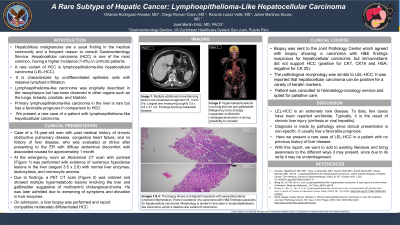Monday Poster Session
Category: Liver
P3043 - A Rare Subtype of Hepatic Cancer: Lymphoepithelioma-Like Hepatocellular Carcinoma
Monday, October 28, 2024
10:30 AM - 4:00 PM ET
Location: Exhibit Hall E

Has Audio
- OR
Orlando Rodriguez-Amador, MD
VA Caribbean Healthcare System
San Juan, PR
Presenting Author(s)
Orlando Rodriguez-Amador, MD, Diego Roman-Colon, MD, Ricardo lopez-Valles, MD, Jaime Martinez-Souss, MD, Jose Martin-Ortiz, MD, FACG
VA Caribbean Healthcare System, San Juan, Puerto Rico
Introduction: Hepatobiliary malignancies are a usual finding in the medical community and a frequent reason to consult Gastroenterology Service. Hepatocellular carcinomas (HCC) are one of the most common, having a higher incidence (1-8%) in cirrhotic patients. A rare variant of HCC is lymphoepithelioma-like hepatocellular carcinoma (LEL-HCC). It is characterized by undifferentiated epithelial cells with massive lymphoid infiltration. Lymphoepithelioma-like carcinoma was originally described in the nasopharynx, but has been observed in other organs such as the lungs, breasts, prostate, and bladder. Primary LELC in the liver is rare but has a favorable prognosis in comparison to HCC. Here, we present a case of a patient with LEL-HCC.
Case Description/Methods: A 74-year-old man with a medical history of COPD, CHD, and no history of liver disease, who was evaluated at clinics after presenting to the ER with diffuse abdominal discomfort with associated nausea for approximately 1 month. At the ER an Abdominal CT scan was performed with evidence of numerous hypodense lesions in the liver (larger 2.7 x 4.1cm) with normal liver enzymes, leukocytosis, and anemia. Due to findings, a PET CT was ordered and showed multiple hypermetabolic lesions involving the liver and gallbladder suggestive of multicentric cholangiocarcinoma. He was later admitted due to worsening of symptoms and elevation in liver enzymes. On admission, a liver biopsy was performed with evidence of moderately differentiated HCC. Case was sent to the Joint Pathology Center which agreed with biopsy showing a carcinoma with H&E findings suspicious for hepatocellular carcinoma, but immunostains did not support HCC (positive for CK7, CK19 and HSA; negative for CK 20). The pathological morphology was similar to LEL-HCC. It was reported that hepatocellular carcinoma can be positive for a variety of keratin markers. After diagnosis, patient was consulted to hematology-oncology service and opted for palliative care.
Discussion: LEL-HCC is an extremely rare disease. To date, few cases have been reported worldwide. Typically, it is the result of chronic liver injury (cirrhosis or viral hepatitis). Diagnosis is made by pathology since clinical presentation is non-specific. It usually has a favorable prognosis. Here we present a rare case of LEL-HCC in a patient with no previous history of liver disease. With this report, we want to add to existing literature and bring awareness to the different ways it may present, since due to its rarity it may be underdiagnosed.
Disclosures:
Orlando Rodriguez-Amador, MD, Diego Roman-Colon, MD, Ricardo lopez-Valles, MD, Jaime Martinez-Souss, MD, Jose Martin-Ortiz, MD, FACG. P3043 - A Rare Subtype of Hepatic Cancer: Lymphoepithelioma-Like Hepatocellular Carcinoma, ACG 2024 Annual Scientific Meeting Abstracts. Philadelphia, PA: American College of Gastroenterology.
VA Caribbean Healthcare System, San Juan, Puerto Rico
Introduction: Hepatobiliary malignancies are a usual finding in the medical community and a frequent reason to consult Gastroenterology Service. Hepatocellular carcinomas (HCC) are one of the most common, having a higher incidence (1-8%) in cirrhotic patients. A rare variant of HCC is lymphoepithelioma-like hepatocellular carcinoma (LEL-HCC). It is characterized by undifferentiated epithelial cells with massive lymphoid infiltration. Lymphoepithelioma-like carcinoma was originally described in the nasopharynx, but has been observed in other organs such as the lungs, breasts, prostate, and bladder. Primary LELC in the liver is rare but has a favorable prognosis in comparison to HCC. Here, we present a case of a patient with LEL-HCC.
Case Description/Methods: A 74-year-old man with a medical history of COPD, CHD, and no history of liver disease, who was evaluated at clinics after presenting to the ER with diffuse abdominal discomfort with associated nausea for approximately 1 month. At the ER an Abdominal CT scan was performed with evidence of numerous hypodense lesions in the liver (larger 2.7 x 4.1cm) with normal liver enzymes, leukocytosis, and anemia. Due to findings, a PET CT was ordered and showed multiple hypermetabolic lesions involving the liver and gallbladder suggestive of multicentric cholangiocarcinoma. He was later admitted due to worsening of symptoms and elevation in liver enzymes. On admission, a liver biopsy was performed with evidence of moderately differentiated HCC. Case was sent to the Joint Pathology Center which agreed with biopsy showing a carcinoma with H&E findings suspicious for hepatocellular carcinoma, but immunostains did not support HCC (positive for CK7, CK19 and HSA; negative for CK 20). The pathological morphology was similar to LEL-HCC. It was reported that hepatocellular carcinoma can be positive for a variety of keratin markers. After diagnosis, patient was consulted to hematology-oncology service and opted for palliative care.
Discussion: LEL-HCC is an extremely rare disease. To date, few cases have been reported worldwide. Typically, it is the result of chronic liver injury (cirrhosis or viral hepatitis). Diagnosis is made by pathology since clinical presentation is non-specific. It usually has a favorable prognosis. Here we present a rare case of LEL-HCC in a patient with no previous history of liver disease. With this report, we want to add to existing literature and bring awareness to the different ways it may present, since due to its rarity it may be underdiagnosed.
Disclosures:
Orlando Rodriguez-Amador indicated no relevant financial relationships.
Diego Roman-Colon indicated no relevant financial relationships.
Ricardo lopez-Valles indicated no relevant financial relationships.
Jaime Martinez-Souss indicated no relevant financial relationships.
Jose Martin-Ortiz indicated no relevant financial relationships.
Orlando Rodriguez-Amador, MD, Diego Roman-Colon, MD, Ricardo lopez-Valles, MD, Jaime Martinez-Souss, MD, Jose Martin-Ortiz, MD, FACG. P3043 - A Rare Subtype of Hepatic Cancer: Lymphoepithelioma-Like Hepatocellular Carcinoma, ACG 2024 Annual Scientific Meeting Abstracts. Philadelphia, PA: American College of Gastroenterology.
